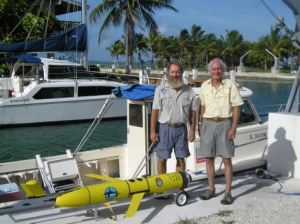- 1 read

Today NRDC, Oceana, and Mote Marine Laboratory launched “Waldo” – an ocean robot that will help defend the environmental and economic bounty of the Florida Keys from impacts from the Gulf oil spill.
Satellite imagery and aerial reconnaissance can only see what’s visible on the surface of the water – they’re not able to tell us the locations and movement of the submerged plumes of oil droplets. These plumes could well be drifting offshore of Florida and without looking to see if they’re there, we won’t know. Enter Waldo, six-and-a-half-foot-long autonomous underwater vehicle (AUV) resembling a yellow torpedo.
The undersea robot is equipped with a fluorometer, which measures the light emitted – or fluorescence – of the water as the AUV travels in the water column. The fluorometer has an LED (light-emitting diode) that sends out ultraviolet light, and if water contains certain chemical components of oil, these chemicals will absorb the light and re-emit it as fluorescence. A detector will see this light emission and report its presence.
Waldo gathers data every few seconds on its journey and transmits the information to researchers via satellite every three hours, giving near real-time information. If oil is detected, researchers will conduct water sampling tests to confirm the presence of oil and, if oil is found, provide local government with this information so that emergency resources and response plans can be activated to help to protect the area’s important ecological resources.
NRDC and Oceana decided to help fund Waldo’s mission because we want to ensure that the ecological treasures off of Florida’s west coast and the Florida Keys are protected – and right now we don’t know enough about the path of the oil plumes. Waldo will help us solve the question of where is the oil.
Waldo is one of a team of robots circling the waters off the west coast of Florida as sentinels for oil. So far, the coast has been clear and the robots have not found evidence of the plumes along their paths. The data they have collected though has provided critical data about water currents and other information that has served to refine their routes. Waldo will patrol the waters north and northwest of the Florida Keys nonstop for about three weeks – the length of its battery life. Adding Waldo to the team will help ensure that the Florida Keys community hears about oil in their waters as soon as it’s found, giving as much time as possible for response plans to be put into place.
This post originally appeared on NRDC's Switchboard.
Ali Chase is a Policy Analyst for NRDC’s Harbor Bight Program. The Natural Resource Defense Council is a non-profit organization dedicated to protecting the environment, people and animals. NRDC was founded in 1970 and is comprised of more than 300 lawyers, scientists and policy experts, with more than one million members and e-activists.

